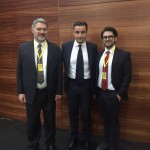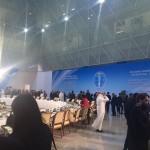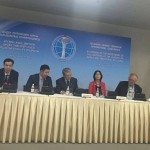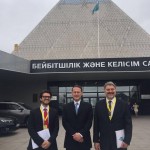On 31th May and 1st June, in the Palace of Peace and Reconciliation of Astana, was held the Conference “Religions against Terrorism”, an event of international importance that saw the participation of political and religious representatives from around the World[1]. During the Conference, Mediterranean Affairs was there, listening and asking questions to delegates. Starting from the opening ceremony, the address of President of Kazakhstan Nursultan Nazarbayev (read by Kassym-Jomat Tokayev, Chairman of the Senate of the Parliament of Kazakistan) sent a clear and peremptory message to all the delegates: We don’t have a single and universal solution to overcoming terrorism that is a phenomenon that has no borders and doesn’t distinguish between the rich and the poor, women and men, civilians and soldiers; for this reason it is important to cooperate at the international level to create a common background of values and objectives that will set up shared international laws and counter-terrorism strategies. The role of Kazakhstan as an international forum where strategies of soft power are discussed and improved, derived from its incredible ethnic and religious diversity that allowed the Governments to gain remarkable experience in terms of managing and granting peaceful coexistence, while neutralizing the terrorists’ clandestine cells[2].
In the context of the conference, Mr. Tokayev warned the diplomats against the expansion of the arsenal of methods and forms of terrorist activity favored by stable funds that allow terrorist groups not only to have access to modern technologies but also to create a quasi-state structure. He made an allusion to Daesh, nowadays’ main terrorist group located in Middle East and spreading throughout the whole world. Daesh gave to itself a clear geopolitical and religious identity, yet it is far from being a real State with true religious identity; in fact, another point highly stressed at the conference was that Daesh distorts and mystifies Islam’s religious message for propaganda and political purposes. In this sense, Mr. Tokayev and other religious leaders as Khaled Akasheh[3] or Mohamed Mokhtar Gomaa[4] said that terrorists promote anti-religious statements that insult the feelings of the believers. For this reason, as it has been said in the International Conference, is necessary a real coordination between religious and political leaders in order to spread the real (and therefore positive) religious messages to people, especially the young, through the same instruments that Daesh uses to recruit militants: namely, social media and the internet. These soft power strategies must be coordinated with hard power strategies in action.
These strategies must be focused in those regions where terrorism spread mainly in the last 15 years: in Central Asia and the Mediterranean area. Referring to the latter, this statement assumes a particular relevance: in fact, the Mediterranean basin is the cradle of the three main monotheistic religions with also several cultures and ethnicities – like Central Asia, but with higher demographic concentration. The influence of religious leaders has become fundamental in the contexts lacking of strong political power, like in Syria: in this country, for example, Syrian political community collapsed, giving space to ethno-religious communities and thus fragmentation; to reduce conflicts among communities and between these communities and terrorist organizations, important aspects of soft power are interreligious dialogue and the adoption of common strategies to counter terrorist propaganda. Vice versa, where there is legitimate political power, the spread of terrorism “linked”[5] to Daesh stems from a problem of nihilism of socio-political communities and of political structures that don’t transmit universal values and don’t take care of social fabric. In fact, one aspect of Daesh’s propaganda is to give a “simple solution” (a “nihilist solution”, we may say) to fill the absence of a real social community and group identities[6]. In these political contexts, the adhesion of many young people to Daesh is a sort of reaction to the sense of marginalization and frustration of the current socio-political circumstance, which is typical of the European Countries but it is present also in other MENA Countries,. Therefore, we should not look at it as “radicalization of Islam”, rather as an “islamization of social radicalization” in Western Countries[7]. This is an aspect that comes to light also in some speeches tackling the “Religious against Terrorism” issue: terrorism is not directly linked to a particular religion[8] and this is a key point that must be clear to every media and government, because in this way religion (Islam in the case of Daesh) has lost so far a huge part of responsibility and vice versa it is a way to burden political sphere with the demand of greater accountability.
To overcome terrorism using this kind of soft power strategies, it is necessary to recover the ancient sense of “Mediterranean Community” as an area where people and governments share peacefully their respective cultures, values, know-hows and interests, which shows a high level of compatibility and complementarity, going beyond cleavages and the “clash of civilization” propaganda.
In conclusion, to defeating terrorism it is necessary not only hard power and cooperation between intelligence, but also managing effectively soft power instruments such as culture, education, networking at international level among parliamentarians and religious leaders and interreligious dialogue. In the latter case, as emerged from the final draft of “Religions against Terrorism” Conference[9]:
We welcome the meeting of Pope Francis of the Roman Catholic Church and Patriarch Kirill of Moscow and all Russia which demonstrated the willingness of religious leaders to set aside all differences and embark on a dialogue in the name of peace. We support the call for the shared global fight against terrorism made by the leaders of the two major Churches. We also acknowledge the significance of the meeting between Pope Francis of the Roman Catholic Church and Supreme imam of Al-Azhar Islamic University Ahmed El-Tayeb with a view to promote dialogue among religious communities.
For the Mediterranean Sea, meaning a Region with a huge political, ethnic and religious diversity, the addressing message that come from Astana is an important guiding light to elaborate and implement common strategies to overcoming terrorist starting from domestic and regional policies with the aim to annihilated the network between Daesh and its “silent constellation”, giving a renewed social identity to the latter composed mostly by young people.
[1] 77 Delegations from Governments (mostly Ministers and Parliamentary Members from 41 Countries), International Organizations (like UN and OSCE) and the 7 most important religions in the World (Islam, Christianity, Buddhism, Judaism, Hinduism, Taoism and Shintoism).
[2] Despite few terrorist attacks between 2014 and 2016 – the last one at Aktobe in June.
[3] Bureau Chief for Islam, Pontifical Council for Interreligious Dialogue for the Holy See.
[4] Ministero f Religious Endowments (Awqaf) of Egypt.
[5] Although in an indirect way.
[6] This is also the thesis of Oliver Roy, French professor at the European University Institute in Florence.
[7] The most part of terrorists that operate and hit in Europe (and in US) are European and US citizens.
[8] In the History every religion has had “its own form of terrorist”. The point No. 12 of the Final Statement of the Participants of the International Conference “Religions Against Terrorism” say clearly that “ we believe that no race, ethnic group, nationality or religion can or should be associated with terrorism and violent extremism”.
[9] Point No. 16 of the Final Statement of the Participants of the International Conference “Religions Against Terrorism”




